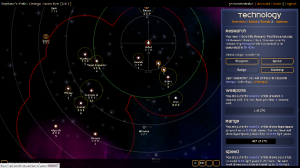223th played so far
Genre: Strategy
Platform: Internet
Year of Release: 2010
Developer: Iron Helmet Games
This game has a bit more of a history behind it. When joining my current place of work, a lot of my new colleagues were heavily invested in an ongoing game of Neptune’s Pride. The betrayal went deep and got, at times, quite frightening. I got in a bit too late to join in, but the hatred that flew around the office in my first few weeks was scary.
It’s an interesting entry on its own. A 4X game, similar to Civilization, but multiplayer only and in realtime. Diplomacy is fairly important. Oh, and there’s some documentation… but without playing, that’s not as useful.
Our Thoughts
I’m not entirely sure what to make of this game’s 4X claim. While there are certainly elements of it and the gameplay is based on it, it does not feature the complexity that is offered by many other games in its genre – Civilization (II) and Sid Meier’s Alpha Centauri being other entries we discussed on the deeper end of the spectrum, or even Medieval Total War, which featured more focus on the in-battle strategy game.
For example, where most other games allow you to work on your internal development – how to create economic growth, balancing that with research, military power and so on – this is reduced to four options in the game. You can spend a certain amount on increasing a star’s economy, industry or science or you can create a fleet. All of this costs differing amounts of money, but after that it’s all straightforward. One point of economy gives you $10 per day, one point of industry is a ship per time period, and so on. Different stars have the same resources, just different upgrade costs. There’s some strategy to it, but it’s not as involved as you see in other 4X games, and it’s just not as fun in that area.
The game’s strength, then, lies in its multiplayer. Rather than a pure realtime experience, the game seems to focus on being a coffee break experience. You have a fleet, and when you want to expand your empire, you send it away. Depending on the stars distance, it takes from a few hours to a day and a half to get there. Your research can shorten that, but it’ll always take some time. This means you have to think and plan ahead and hope your scanners reach far enough to warn you of upcoming attacks.
The decision making behind it – making and breaking alliances, invading and deciding who to go for, finding your strengths and how to grow or conquer – is what becomes interesting.
The same simplicity carries through in the game’s interface. It’s abstract and the only bit of art is that of the players’ species, who have an alien drawing representing you. These are frightening and look amazing. Beyond those, however, it’s all numbers, dots and mini ships. Interchangable and simple, it’s all reduced to a couple of numbers and some basic names. Nothing too clever, just all matter of fact. Nothing more is necessary, and suitable for a simpler indie game like that, but it’s worth remembering there’s nothing here. Just as your upgrades are abstract, so is everything else in the game.
Final Thoughts
Due to the amount of time it took to play this game (two weeks during lots of small breaks) Peter didn’t have a chance to participate, hence no comments from him.
This game works well as a multiplayer 4X game, and it can be a blast to play with a larger group – especially when you properly get into the diplomacy side of it. On its own, though, the game pales a bit in comparison with the other games, and it doesn’t match up for that. It’s a game where you need the right friends.

[…] you can say it instead. Minecraft is the biggest contemporary example, or for something we covered, Neptune’s Pride doesn’t need much more. Maybe you’ll use cut scenes for your exposition dumps. Long, […]